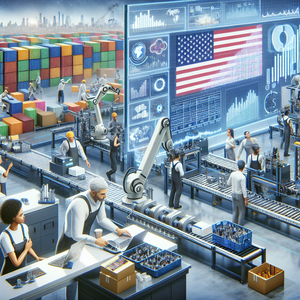Innovative Technologies Transforming Supply Chain Management

AI has emerged as a game-changer in the realm of inventory management. By analyzing vast amounts of data, AI algorithms can identify patterns and trends that human analysts might miss. For instance, companies like Amazon utilize AI to predict order volumes based on historical data, seasonal trends, and consumer behavior. This allows them to optimize stock levels, reducing the risk of overstocking or stockouts and enhancing customer satisfaction.
Machine Learning for Enhanced Decision-Making
Machine learning, a subset of AI, enables systems to learn from data without being explicitly programmed. In supply chain management, this technology analyzes past inventory data to improve future forecasts. By continuously learning from new data inputs, machine learning systems can adapt to changing market conditions, such as shifts in consumer preferences or economic fluctuations.
Internet of Things (IoT) for Real-Time Inventory Tracking
The Internet of Things (IoT) has revolutionized how businesses monitor and manage their inventory. IoT devices, such as RFID tags and smart shelves, provide real-time data on stock levels, location, and condition. This data enables companies to make informed decisions about when to reorder products and how to optimize their supply chain operations.
Blockchain for Transparency and Security
Blockchain technology offers a decentralized and secure way to track inventory throughout the supply chain. By providing a transparent and immutable ledger, blockchain can enhance traceability and accountability in inventory management.
Robotics and Automation in Warehouse Management
Robotics and automation are transforming warehouse operations, enabling companies to optimize inventory management processes. Automated systems can handle tasks such as picking, packing, and sorting, reducing human error and increasing efficiency.
The integration of innovative technologies in supply chain management is reshaping the landscape of inventory planning and management. From AI and machine learning to IoT, blockchain, and robotics, these advancements are enabling businesses to forecast needs more accurately, streamline operations, and enhance decision-making processes.
Supply Chain Data Scientist
Amazon, Walmart, Coca-Cola
Core Responsibilities
Develop predictive models using machine learning to optimize inventory management and demand forecasting.
Analyze large datasets to identify trends and insights that inform supply chain strategies.
Collaborate with cross-functional teams to implement data-driven initiatives that enhance operational efficiency.
Required Skills
Proficiency in programming languages such as Python or R, with experience in machine learning libraries (e.g., TensorFlow, Scikit-learn).
Strong analytical skills with a background in statistics and data visualization tools (e.g., Tableau, Power BI).
Familiarity with supply chain processes and inventory management principles.
IoT Solutions Architect for Supply Chain
Target, Siemens, Bosch
Core Responsibilities
Design and implement IoT systems for real-time inventory tracking and management.
Collaborate with hardware and software teams to integrate IoT devices into existing supply chain operations.
Monitor and analyze data from IoT devices to optimize inventory levels and reduce waste.
Required Skills
Experience with IoT platforms and protocols (e.g., MQTT, CoAP).
Strong understanding of network architecture and data analytics.
Ability to work with cloud computing services (e.g., AWS, Azure) to deploy IoT solutions.
Blockchain Supply Chain Analyst
IBM, Walmart, Deloitte
Core Responsibilities
Evaluate and implement blockchain solutions to enhance traceability and transparency within the supply chain.
Analyze supply chain data to identify inefficiencies and suggest improvements using blockchain technology.
Collaborate with legal and compliance teams to ensure blockchain implementations adhere to industry regulations.
Required Skills
Knowledge of blockchain technology and smart contracts.
Proficiency in data analysis tools and techniques, with an emphasis on supply chain operations.
Strong communication skills to convey complex technical concepts to non-technical stakeholders.
Inventory Optimization Specialist
Procter & Gamble, Nestlé, Unilever
Core Responsibilities
Develop strategies to optimize inventory levels and reduce holding costs while ensuring product availability.
Monitor inventory performance metrics and implement corrective actions based on analysis.
Collaborate with suppliers and logistics teams to improve inventory turnover rates.
Required Skills
Strong understanding of inventory management software and ERP systems (e.g., SAP, Oracle).
Excellent analytical skills, with experience in statistical analysis and forecasting methods.
Ability to work collaboratively across departments and manage relationships with vendors.
Robotics Process Automation (RPA) Specialist in Supply Chain
Ocado, DHL, FedEx
Core Responsibilities
Design and maintain robotic automation processes to streamline order fulfillment and inventory management.
Analyze existing workflows to identify opportunities for automation and efficiency improvements.
Train staff on new robotic systems and monitor their performance to ensure optimal operation.
Required Skills
Proficiency in RPA tools (e.g., UiPath, Automation Anywhere) and understanding of scripting languages.
Strong problem-solving skills with an analytical mindset to assess workflow efficiencies.
Familiarity with supply chain operations and logistics management.


